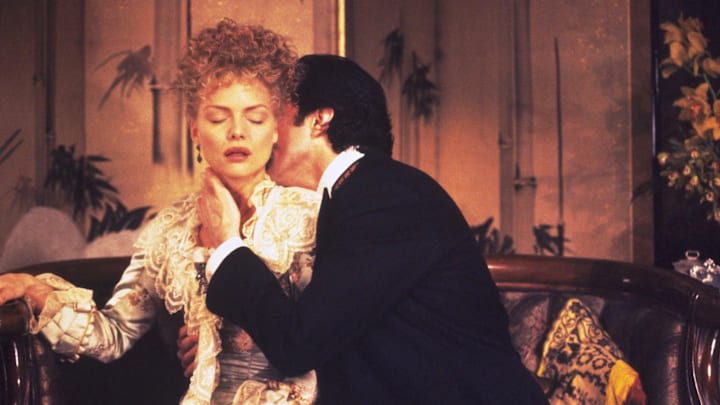There aren’t exactly rules about how far in the past a film must be set in order to qualify as a period piece; technically, one that takes place in the early 2000s could fit the bill. But thanks in part to all the Jane Austen adaptations and movies about long-dead monarchs, the phrase period piece often evokes poofy dresses and elaborate manors—or, at the very least, a story set before many viewers were born. Here are 10 top-notch options to consider the next time you’re in the mood for a historical drama that may or may not feature fancy hats.
1. A Room With a View (1985)
Merchant Ivory Productions’ A Room With a View, based on E.M. Forster’s 1908 coming-of-age novel, was a star-making vehicle for two now-household names, Helena Bonham Carter and Daniel Day-Lewis. The film also contains a Forster Easter egg: The gossip that Eleanor Lavish (Dame Judi Dench) shares with Charlotte Bartlett (Dame Maggie Smith) during their picnic echoes the plot of Forster’s novel Where Angels Fear to Tread. Bonham Carter went on to star in the 1991 adaptation of that book, too.
2. The Age of Innocence (1993)
Martin Scorsese’s adaptation of Edith Wharton’s 1920 novel depicts 1870s New York City in all its Gilded Age glory. But one publicity image printed in Us magazine looked a little more modern: Michelle Pfeiffer, ardently embracing Daniel Day-Lewis, was accidentally clutching a roll of Certs mints. “Oops!” said then-Columbia Pictures executive Sidney Ganis.
3. Elizabeth (1998)
Elizabeth, director Shekhar Kapur’s first English-language feature, chronicles Queen Elizabeth I’s early years on the throne. Cate Blanchett received a Best Actress in a Leading Role Oscar nomination for portraying the ruler, but lost to Gwyneth Paltrow for Shakespeare in Love. Ironically, Dame Judi Dench won the Best Supporting Actress Oscar that year for playing a much older Elizabeth I in … Shakespeare in Love.
4. Gosford Park (2001)
Robert Altman was kicking around the idea of directing an Agatha Christie–style whodunit when his friend Bob Balaban suggested a screenwriter: Julian Fellowes, a real-life British lord who was still years from creating Downton Abbey. Fellowes took the offer and Balaban co-produced (and co-starred in) what became one of the most entertaining portrayals of 1930s British high society in film history. Despite the movie’s massive ensemble cast, Altman didn’t let the actors swoop in for a few days to shoot only their scenes—everyone had to sign on for all 10 weeks.
5. Atonement (2007)
To translate Ian McEwan’s World War II romantic drama Atonement for the screen, director Joe Wright bucked convention by casting Saoirse Ronan as the youngest iteration of Briony Tallis before choosing the two actors who’d play the character at older ages (Romola Garai and Vanessa Redgrave). During joint rehearsals, Garai and Redgrave worked to match Ronan’s mannerisms, rather than the other way around.
6. 12 Years a Slave (2013)
Sir Steve McQueen had already been considering developing a movie about a free Black man sold into slavery when his wife recommended he read 12 Years a Slave, Solomon Northup’s 1850s memoir in which that very thing happens. Despite the violent nature of the film—and McQueen’s commitment not to “sugarcoat” the era—Lupita Nyong’o (who plays Patsey) described the set as “a very safe and sacred place.”
7. Belle (2013)
Belle is based on the true story of Dido Elizabeth Belle, the daughter of a British naval officer and an enslaved African woman, who was raised as a British aristocrat in the 18th century. The portrait that Dido (Gugu Mbatha-Raw) and her white half-sister, Elizabeth Murray (Sarah Gadon), sit for in the film is a recreation of a real portrait—one that inspired Misan Sagay to write the initial screenplay and director Amma Asante to sign on to the project.
8. Neruda (2016)
Because director Pablo Larraín considers Chilean poet Pablo Neruda “impossible to put in a box,” he instead developed an “anti-bio” that fictionalizes Neruda’s (Luis Gnecco) 1948 escape from Chile—adding a made-up inspector who pursues him (played by Gael García Bernal). To give the film its distinctly vintage feel, Larraín—who also directed the Oscar-nominated biopics Jackie (2016) and Spencer (2021)—combined red and blue to create a faint purple filter.
9. The Favourite (2018)
The Favourite recounts (with artistic liberties) the historical rivalry between the two closest companions of Queen Anne (Olivia Colman), who ruled Great Britain from 1702 to 1714. To help the actors absorb the story’s comedy, director Yorgos Lanthimos padded rehearsals with whimsical tasks, like trying to avoid collisions while walking backwards, and interlocking arms to create what Rachel Weisz called “a human pretzel.”
10. Portrait of a Lady on Fire (2019)
Céline Sciamma’s evocative romance follows the illicit relationship between an 18th-century French artist (played by Noémie Merlant) and the high-born young woman (Adèle Haenel) she’s been commissioned to paint. Oil painter Hélène Delmaire created nearly all the art in the film, clocking roughly three months’ worth of 16-hour days.
